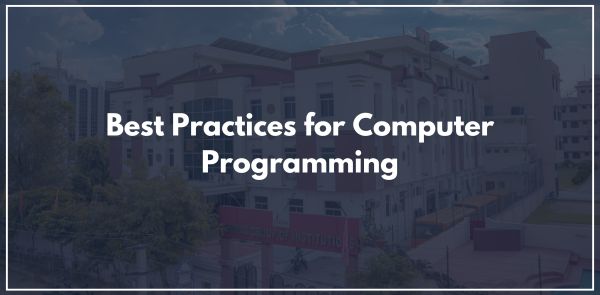
Best Practices for Computer Programming: Writing Clean, Efficient, and Maintainable Code
Effective computer programming goes beyond simply writing code that works. It's about crafting solutions that are not only functional but also readable, maintainable, and efficient. Here are some best practices that can help you write better code:
1. Plan Before You Code:
Define the Problem Clearly: Before writing a single line of code, ensure you have a clear understanding of the problem you're trying to solve. Break down the problem into smaller, more manageable sub-problems.
Choose the Right Algorithm and Data Structures: Select appropriate algorithms and data structures based on the problem's requirements and the desired performance characteristics (e.g., time and space complexity).
2. Write Clean and Readable Code:
Use Meaningful Variable and Function Names: Choose descriptive names that accurately reflect the purpose of variables and functions. Avoid cryptic abbreviations or single-letter names.
Consistent Formatting: Adhere to consistent indentation, spacing, and line breaks. This improves code readability and makes it easier to spot errors. Consider using a linter to automatically enforce style guidelines.
Add Comments: Include comments to explain the purpose of code blocks, complex algorithms, and design decisions. Comments should be concise and informative, not merely restating the obvious.
3. Modularize Your Code:
Break Down into Functions: Divide your code into smaller, well-defined functions with specific responsibilities. This improves code organization, reusability, and testability.
Use Classes (if applicable): If you're working with object-oriented programming, use classes to encapsulate data and behaviour, making your code more modular and easier to maintain.
4. Test Thoroughly:
Write Unit Tests: Write unit tests for individual functions and components to ensure they behave as expected. This helps to identify and fix bugs early in the development process.
Perform Integration Tests: Test how different parts of your code interact with each other to ensure they work together correctly.
Conduct User Acceptance Testing (UAT): Involve users in testing the final product to ensure it meets their needs and expectations.
5. Optimize for Performance:
Profile Your Code: Identify performance bottlenecks using profiling tools. This helps you pinpoint areas where your code is running slowly.
Use Efficient Algorithms and Data Structures: Choose algorithms and data structures that have the best performance characteristics for the given problem.
Minimize Memory Usage: Avoid unnecessary memory allocations and deallocate memory promptly to improve memory efficiency.
6. Practice Version Control:
Use a Version Control System: Use a version control system like Git to track changes to your code, collaborate with others, and revert to previous versions if needed.
7. Stay Updated:
Learn New Technologies: Keep up-to-date with the latest programming languages, frameworks, and best practices.
Continuous Learning: Continuously learn and improve your programming skills through online courses, books, and practice.
8. Collaborate and Learn from Others:
Code Reviews: Participate in code reviews with other developers to get feedback on your code and learn from their expertise.
Pair Programming: Work with another developer on the same code, which can improve code quality, knowledge sharing, and problem-solving.
By following these best practices, you can write cleaner, more efficient, and maintainable code that is easier to debug, test, and modify over time. It improves your productivity as a programmer in Poddar International College which leads to better career prospects.
The Poddar Group of Institutions, one of the best colleges in Jaipur, regards programming as more than just writing code; it is the journey of holistic development. The main focus on experience-based learning and practical exposure enables students to get hands-on experience, in specialized labs, with the latest technology. A constant commitment to global exposure ensures that its students stay abreast of the evolving changes in the field, thus providing the necessary skills to excel in a competitive world.